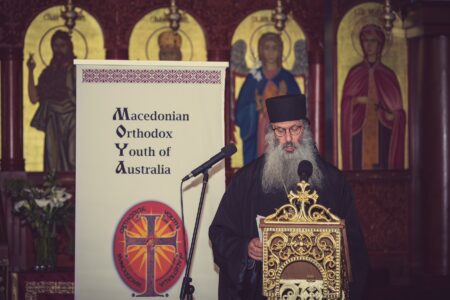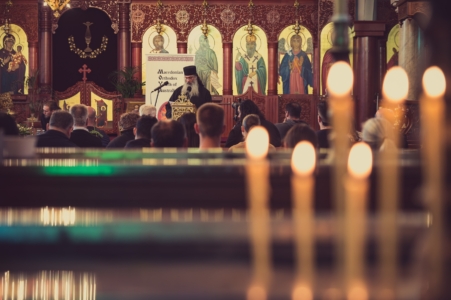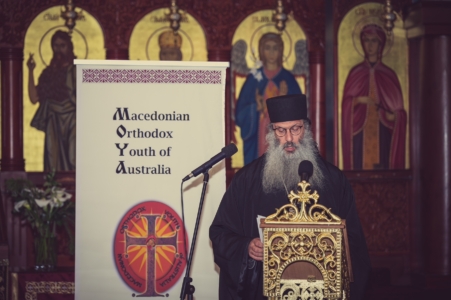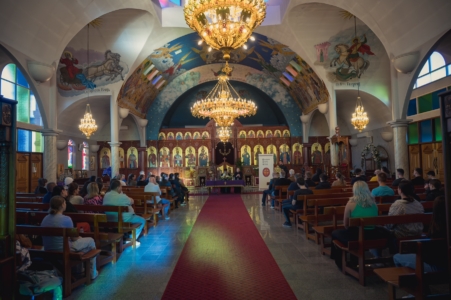
We Christians, based on biblical teaching, confess that man is a rational being created in the image and likeness of God. This means that not only is he a rational being, but his origin is Divine, and his designation, that is, the goal(purpose) of his existence is to become the likeness of God, that is, to deify himself. Therefore, human life is exalted and has a high purpose.
However, as a result of the sin of our ancestors Adam and Eve, not only does man not live a Divine, exalted life, but he is so humiliated and fallen even to the level of the irrational animals. His life becomes carnal, captured by passions, and his purpose becomes earthly – in the satisfaction of his passions. Today sometimes even irrational animals live more dignified than humans and we can often learn from them.
But no matter what the situation is today, still, man is man and should strive for his true goal (meaning). Our goal and our aspiration in this life is to become similar to Christ. That is why the Holy Fathers of the Church say that “God became man, so that man could become god by grace”. That is why Christ became man, in order to lift up our fallen nature and show man as he should be. Therefore, Christ is the centre and criterion of our life and everything in life is Christocentric. This means that we should strive toward Christ because He alone is the way, the life and the truth and there is no other way; life and truth outside of Christ.
Humanity records great persons, whom we call Saints and who have become glorified due to their way of living and who have also helped others to rise to that level or close to them. Let us not list the holy Prophets, Apostles, preachers, martyrs, confessors, and venerable people. All of them left an important mark in history, not only on Christianity, but also on the entire civilization, of which there is no mention in today’s world of knowledge.
Gradual renouncement of Christ
Historically observed, we can notice how humanity gradually renounces Christ and gradually loses the level of social ethics of living. We find the beginning of that descent in the great schism of the 11th century, the breakaway of Western Christianity from Orthodoxy and their later innovations. As a consequence of this, Protestantism appeared, and with the rebellious ideas of Luther, who instead of returning to the roots, invented a new direction in Christianity; innovations from which we now come across thousands of reformation denominations, each of which claims to possess the truth.
Not long after that, the theology, which should spring from the purified heart from the experiential communion with God, relies more and more on the fallen reason of humanity in the educational institutions of scholasticism.
After losing communion with God and the true theology, the human mind begins to go astray and begins to seek the truth outside of God, that is, outside of the Church, so outside of the Truth. A new philosophy of man appears and replaces real leaders, real exampes with false ones. Then comes the passionate, sinful people, who become the authority and criterion for the truth. People to whom darkness is light. In that way, man’s only goal, which is to strive toward God, was lost. Humanity has lost focus and adjusted to the wide road of this world, dead-end-road which leads nowhere.
With the emergence of the Renaissance movement and humanism, the period begins in which the secular penetrates the sacred and there was an attempt for the sacred to be changed. God is slowly pushed out of the centre, so instead of Him, man becomes the centre of events. Secular teaching is introduced in schools and universities. Self-will and voluptuousness become the ethics of living.
This process of alienation from God continues with the influence of the French philosopher and mathematician René Descartes. The next step was the final break with the theocentric view of the world, in order to fully rely on human reason which is fallen and darkened. René Descartes is considered the creator of modern philosophy and, as such, he begins the catastrophic turn of contemporary social thought backwards.
In the last century, the countries of Eastern Europe (mostly Orthodox) accepted Marxist teaching, whose ideology and social order were based on materialism and atheism. Under the pretext of “the rights of the weak” and “equality”, the idea is spread that religion (namely Christianity and above all Orthodoxy) becomes the most serious enemy and “opium” for the people and as such must be destroyed. In the already civilized 20th century, the final, and one of the most terrible, persecutions of the Church and Christianity was carried out, in which millions of Christians, especially Monastics and Clergy, were killed in the most brutal way.
The open attack on religion and Christianity is continued by another German philosopher, Friedrich Nietzsche (1844 – 1900), who is considered one of the most influential philosophers of all modern thinkers. His apostate thought goes so far as to declare God dead, so that man with his will for power, can become a superman, a man-god, the opposite of God-man.
For him, only one Truth does not exist, but each person has his own truth. He is an opponent of moral norms and supports an individualistic self-sufficient life in the enjoyment of urges and passions. He is an advocate of nihilism, according to which life has no meaning, it is simply a cyclical movement in a constant struggle in which the strongest win. Nihilism is just applied atheism. If there is no God, if there is no immortality there are no virtues and in that case everything is permitted.
On this path of dehumanization of man, which continues to trace the path of apostasy and the ruin of humanity, we would add the psychologist and founder of the deep-psychoanalysis, the Austrian Sigmund Freud (1856-1939), and end with him. He bases his entire theory of humanity on the sexual drives and the unconscious mind in man and develops a model of a psychic structure consisting of id, ego and super-ego.
In the same vein, Martin Heidegger (1889–1976), and Jean Paul Sartre (1905–1980) continue in Nietzsche’s footsteps and develop the philosophy of so-called existentialism. According to them, life becomes aimless and meaningless (lacks meaning and purpose and the universe is inherently meaningless.) Furthermore, Albert Camus (1913–1960) promotes idea of absurdity of living and he sees suicide as liberation.
In today’s era of Postmodernism, with the denial of objective truth and the world culture according to which everything is relative and subjective, the door to the future of the “Woke” movement is opened, which will erase any category and norms.
Let us answer the question of our topic: Is the Orthodoxy still relevant today?
Jesus Christ is the same yesterday, today and tomorrow. He is alpha and omega, the beginning and the end. He IS, He is pre-eternal and always He will be. He is the head of the Church, and the Church is His body. He is the helmsman of the Church, which is tossed by the winds of the worldly temptations, but it will remain until the end of the ages and the gates of hell will not shake it. Anyone who is baptized and confess the Orthodox faith and lives in an Orthodox manner, becomes a sound member of the Church and coeternal with Christ. However, in today’s world, the problem is not in Christ, nor Christianity, nor the Church. Christ is the same and the Church is the same, and the one who has been changed is man. The Church has not lost the grace and action of the Holy Spirit, but since God is love and respects the complete freedom of man, who himself has forsaken God, consequently the man was devoid of that power and became powerless and mortal. Relinquishing eternity, we become entwined to degradation, to transience, to sin, death and decay.
Christ never has left us and He will not leave us and He is not giving up on us during these times. Also, in our time there are Saints who testify to the truth of the Christianity and the Orthodox Faith. Not as numerous as in the past, but still present. We will single out, Saint Seraphim of Sarov, the Venerable “bakchushka” whose face was illuminated by the light of the grace of the Holy Spirit and for whom every other face was a source of joy of the resurrection. Saint John of Kronstadt who converts and returns to the Church a multitude of people infected by the western disbelief and decadent morals. On the Holy Mount Athos, the simple monk, Saint Joseph the Hesychast stands out, who restores monasticism on the Holy Mountain, and not only on the Holy Mountain, but also more widely in Orthodoxy, extending even unto Saint Ephraim of Philoteia and Arizona in North America. In that list we can also include our Venerable Gavril the Athonite, Episcope of Velika, a great hermit and a man of prayer, who through his life and the power of prayer reached the level of wonderworking, and kept his people from completely falling into the apostasy of atheism at that time. We can also mention St. John Malsimovich of Shanghai and San Francis the Barefoot and St. Nectarius the Sufferer of Aegina, Elder Paisous Athonite. It is useful for us to mention the venerable father Justin Popovic Keliski and the blessed Seraphim Rose, who bravely and openly write about these topics with a deeply orthodox meaning. Of course, there are many others that we cannot mention due to the constraints of time.
Today’s Lifestyle is changing. Mankind, seeking freedom, becomes less and less free. Mankind freed itself from God, who is good and the source of all good and therefore became a slave to sin and satan, who is the source of all evil.
Where is the key to all problems?
Sin. Man’s principal passion is SELF-LOVE. Self-love is divided into three main sub-passions: Love of glory – Vainglory, Love of pleasure – Self-indulgence, and Love of money – Avarice. Pride, vanity, and a high opinion of oneself is the greatest sin. All philosophers, social movements, and other religions ignore sin, and the one who is behind the sin, and therefore cannot solve the problem of man and death. Whether they wanted it or not, whether or not they recognised it; sin, and through it death as well, exist, and having entered humanity completely infected it.
Repentance is the awareness of our fallen, proud human nature, and that is our greatest need today. Awareness that we are on an opposing path to the truth, life and Christ, and we are want to return. The Ascetic – hesychastic struggle, sustained by the Eucharistic life in the Church, cleanses the heart from passions and returns man to God. Repentance and purification of the heart from passions requires toil, effort, fight, deprivation and struggle. There is simply no victory without a fight. Only by living in this way can we say that we have gained meaning in our life and we are people according to the true calling as it is we should be.
What is the weakness of all these worldly leaders and their teachings?
Not even one of these great minds together with their wisdom and movements have resolved the problem and have not answered how we can defeat death. They have all died, and many of them in a terrible way. Only Christ gives the answer how to defeat death and only Christ defeated death and therefore I choose to follow only Christ.
In conclusion, I will use the words of the famous Russian writer Fyodor Dostoyevsky, who himself, after many struggles with these difficult and damning questions to finally make up his mind and confess from the depths of his suffering heart, he will say:
“Immerse yourself in Orthodoxy, only within it is the Image of Christ.” In all its purity, the Image of Christ has been preserved in Orthodoxy.
I believe that there is nothing lovelier, deeper, more sympathetic, more rational, more manly and more perfect than the Saviour; If anyone could prove to me that Christ is outside the truth, and if the truth really did exclude Christ, I should prefer to stay with Christ.”
Father Gavril Galev
Abbot of the Monastery “St. Clement of Ohrid”,
Kinglake, Melbourne, Australia
16 / 10 / 2024





